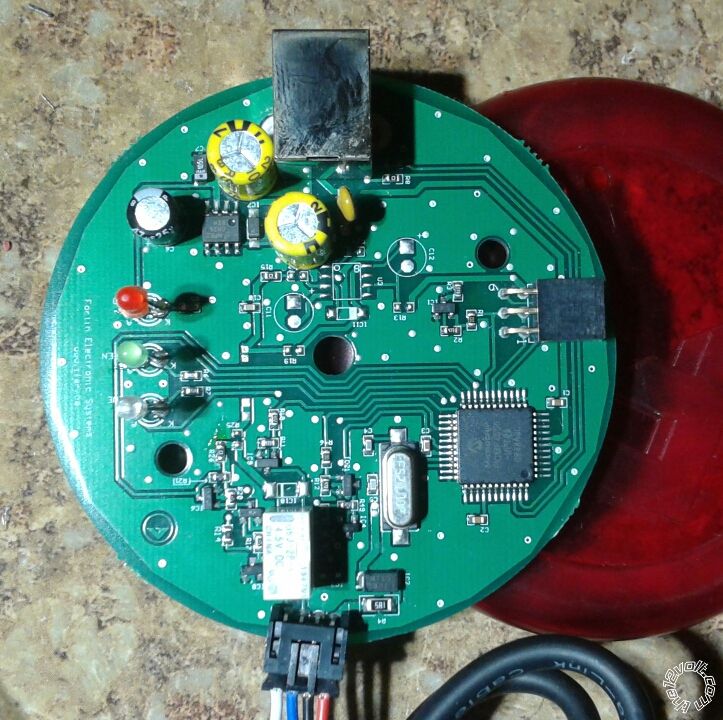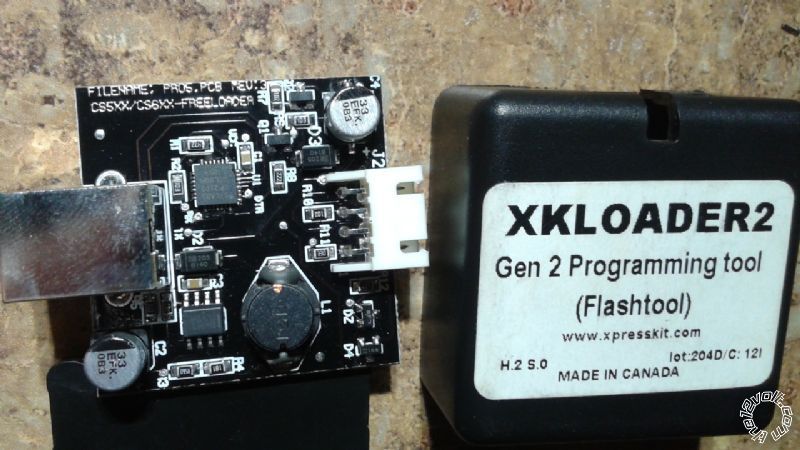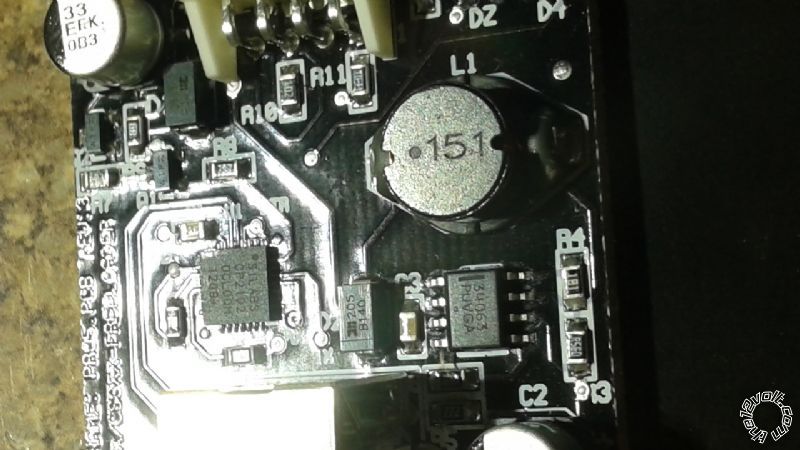idatalink programming cable diy
Printed From: the12volt.com
Forum Name: Car Security and Convenience
Forum Discription: Car Alarms, Keyless Entries, Remote Starters, Immobilizer Bypasses, Sensors, Door Locks, Window Modules, Heated Mirrors, Heated Seats, etc.
URL: https://www.the12volt.com/installbay/forum_posts.asp?tid=137293
Printed Date: February 15, 2026 at 9:04 PM
Topic: idatalink programming cable diy
Posted By: pmarcus
Subject: idatalink programming cable diy
Date Posted: September 20, 2014 at 9:48 AM
Has anyone ever taken apart that $50 idatalink or flashlogic programming cable? It clearly has an FTDI USB to UART bridge in it so I'd guess it'd be pretty simple to build your own or use an off the shelf USB-RS232 cable if you could be assured of the pinout and what transceiver is used in the cable (if any).
Replies:
Posted By: catback
Date Posted: September 20, 2014 at 10:42 AM
I don't think anyone is quick to hack apart a $50 cable that works to attempt to build one for half price.
If you'd like to experiment with your money then please do and let us know your findings. If the cable is as basic as you think it won't be difficult to recreate, just Power, Ground, TX, and RX. Easy enough to test for and hookup.
Posted By: pmarcus
Date Posted: September 20, 2014 at 3:53 PM
catback wrote:
I don't think anyone is quick to hack apart a $50 cable that works to attempt to build one for half price.
If you'd like to experiment with your money then please do and let us know your findings. If the cable is as basic as you think it won't be difficult to recreate, just Power, Ground, TX, and RX. Easy enough to test for and hookup.
Super helpful comment, thanks!
Posted By: yellow_cake
Date Posted: September 20, 2014 at 6:45 PM
Wow, I thought they would use something proprietary to make it almost impossible to re-create... How can you tell what they've used if you haven't taken one apart yourself?
I have one of these for an arduino programmer: www./itm/181438947135
I wonder if that would serve a purpose... It has RX, TX, VCC, GND pin outs labeled.
Posted By: pmarcus
Date Posted: September 20, 2014 at 9:21 PM
The reason I believe it's likely is because of the driver required to install the USB cable. I saw references to standard FTDI drivers. I can't imagine anything more complicated than one chip for the USB to UART bridge and MAYBE another chip to establish a hardware protocol like RS232 or RS485.
After looking at the driver for the weblink I found the following USB IDs:
VID_03EB&PID_2018
VID_274B&PID_0001
The first one being an off the shelf (at least partially) implementation from Atmel. https://www.mikrocontroller.net/attachment/70264/USB_device_details.pdf
The second one I couldn't find so it may be more custom.
Additionally the DBALL2PRO version of the module install a standard silicon labs CP210x virtual comm port driver. So that certainly supports my suspicion as well.
I think I read that the idatalink and xpress kit stuff were the same just branded differently? I could be wrong there.
It's pretty likely that it just looks like a standard COMM port in windows, though they (in the idatalink case) might have added something "special" for the weblink software to identify the port.
I was hoping that someone else had poked at one. If I end up buying one to do a bypass install I'll end up taking it apart but I'm not positive I'm going to put the remote start in.
Posted By: yellow_cake
Date Posted: September 20, 2014 at 9:39 PM
Oh I see, I've never looked into the driver as I've never owned the cable. A quick google search for idatalink ftdi does turn up results for drivers...
To answer your question about Xpresskit and Idatalink, they are not the same. None of their products are rebranded of one another.
Idatalink is geared towards install shops so buying them locally for me is way more expensivet than Fortin or Xpresskit...
Posted By: catback
Date Posted: September 21, 2014 at 12:05 AM
You'd be surprised how basic programming cables for various hardware can be so it wouldn't surprise me if the ads-usb cable is merely an off the shelf usb to TTL converter. A loopback test would give it away. Even then the only way to know if a home brew cable would work is to make one and test it. Unfortunately, there's not alot of demand in DIY ADS flashing so not alot of interest in testing, trying, or hacking open an ADS-USB cable. The local idatalink dealers already have cables, and the DIY customers mostly get the unit pre-flashed from the seller or have a local dealer flash it. The very few rest buy the cable for a one or two time use deal.
As for it being proprietary, not really necessary. They aren't making alot of money off of cable sales because under normal circumstances only authorized dealers and installers are the expected users of the programming cable and that demographic doesn't buy cables regularly. They make their money off of the actual bypass modules. Another reason against custom proprietary chips is cost. It costs a good deal to make completely custom chips and when your planned sales figures for such an item is limited (only dealers and installers are the foreseen purchasers) it just doesn't make sense. That said it's easy to lock the software to a particular off the shelf chip or change a small setting in the OTS chip and lock to that setup.
What you need is individuals more interested in playing with the cable than installing remote starts and other stuff into cars and trucks.
Posted By: shafferny
Date Posted: September 21, 2014 at 9:07 AM
I bought my ADS flash cable of eBay for about $35. For the cost, it's not worth trying to come up with some sort of home-brew cable. By the time I were to source the parts, mess with it, and potentially fry a bypass module or two, it's just not worth it to me.
Having said that. It sounds like you know more about what you're doing than I do. If you can reverse engineer the ADS cable and put together a parts list for DIY folks, cool!
Posted By: pyro6314
Date Posted: October 15, 2014 at 2:20 PM
I tried to program one with and FTDI chip to no avail. Supplying 5v to the device and running the Weblink ACtiveX wouldn't detect the module (ALCA) albeit it would communicate to the driver/COM port. Lots of digging came to some results although.
The supplied driver appears to be simply an .inf file that uses the Windows native usbser.sys USB driver. This employs a generic CDC/ACM standard protocol that appears is going to be the new standard when people move away from using proprietary devices like FTDI (if they ever do). The VID/PID's that were posted above are from that inf file and as said indicate an Atmel chip. On some of the arduino's they use a second Atmel chip which is programmed to emulate the FTDI chip. This allows the use of the FTDIbus.sys driver but not the ftdiport.sys driver. (If you're familiar there are two drivers). Ontop of the bus sits this usbser.sys driver.
None of the USB->Serial devices I have found support this driver or CDC/ACM protocol. Modifying the inf file and forcing it to install gives freezing/BSD. Not the way to go considering the actual programmer uses soely the FTDI drivers. So I tried the AT8/12 programmed to emulate the FTDI and use the usbser.sys which I was able to make talk just fine, STILL did not find the module even though the ActiveX was talking to the COM port. That was the last straw, so I bought the damn programmer in town for $106. (I'm impatient)
It works... so I dug into it. It uses the FT232RL which requires? an external EEPROM which is also onboard. I think this only contains a 1K ROM of configuration information for the FT232 and has nothing proprietary on it like handshake data. The board supplies 12V (from the USB 5v) via an unidentified IC and is switched by the DTR# pin on the FT232 through a HEXFET. The ActiveX serial COM appears to turn on the DTR pin only when it wants to talk. Otherwise, it is pure 5v TTL Serial Tx/Rx from the FTDI232 to the ATMEL micro inside the ALCA module.
I plan on trying this out when I get a new key for my car which likely requires reprogramming. I have some good pics of both sides of the programmer board (ADS-USB) if anyone is interested, I won't be posting them here.
Posted By: bentrod
Date Posted: December 26, 2014 at 2:25 AM
hey pyro any luck or more info about the cable?
I've worked with cp21xx and FT232xx before and know some of the settings can be burned one time (like VID/PID + other GPIO settings)
This makes me think everything that's getting passed to the usb host can be spoofed to make it look just like the idatalink cable.
Would it be too much to ask if for you to get a wireshark dump of the device when it enumrates and when it's doing whatever with the silly webupdater program?
I'm new to the remote start community so the device I need to use (ALCA) hasn't arived yet for me to play with. Nor do I plan on spending $50 for a cable that I'm going to use once.
If I can get someone to give me a dump of the usb side, I can work on the rs232 side so hopefully in the future people can just upload .bins to their devices without being connected to the internet.
Posted By: 7808
Date Posted: December 08, 2015 at 8:22 PM
i was just googling this and came across this thread lol i was looking at the idatalink flash cables for $40-50 thinking dammit.. im sure thats just a usb-serial cable which i already have sevral of from other misc projects
i think its not about being cheap, as much as hating getting overcharged for somthing thats seriously $2 on ebay or anywhere, and you may already have
https://www./itm/USB-2-0-to-TTL-UART-Module-5pin-Serial-Converter-CP2102-STC-Replace-FT232-/161282081867?hash=item258d29444b:g:mu0AAMXQ74JTVPuJ
Posted By: pyro6314
Date Posted: December 09, 2015 at 4:43 PM
Hey 7808, got your PM and thought I would follow up (Although a year late for the last guy).
I never attempted to recreate the circuit or software handshaking. I do have a serial data log of the ActiveX Module talking to the COM port with various hardware configs which may be useful if someone wants to attempt reverse engineering this thing. Additionally, I might be able to dig up those pictures of the board. I really think the key is using a serial device that supports the CDC driver (like the Atmel programmed to act like an FTDI232) and having the device power switched by the DTR line on a Hexfet. The power switching must be the key to making the ActiveX program happy with respect to timing.
Let me know if I can be of help. I'd like to see someone successfully program one of these things.
Posted By: rs specialist
Date Posted: December 09, 2015 at 5:21 PM
Even if you are able to make this work, you still need approval from ADS to flash their firmware. Why not buy the product and support the company.
Posted By: roger555
Date Posted: January 24, 2016 at 7:31 AM
FYI just ordered mine from amazon for 28.99 shipped
https://www.amazon.com/Autopage-ADSUSB-Cable-Driver-Update/dp/B0035F0KZC/ref=pd_cp_422_3?ie=UTF8&refRID=08SEFXV28S8A6PD37624
Posted By: northern
Date Posted: February 05, 2016 at 5:03 PM
My only advice is to price shop your distributors. I think I paid $29 for mine, probably 4 or 5 years ago. But other distributors had them for $45+.
Good luck and post results if you can get a knock off made. Nice to have a backup incase you run over the original or another installer "accidentally" brings it home for the weekend.
Posted By: brownsfan1
Date Posted: February 05, 2016 at 8:55 PM
You still need a log in. You need to be approved by ADS before they will give you one. Their products are not marketed or engineered for the DIY market. Not saying there are not DIY guys capable of installing their products that's just not their intentions. I got my cable from Audiovox(Flashlogic) free when I bought a bunch of modules. Actually sent me 2. The only one I paid for was the phone/tablet version. That thing is a life saver for buys like me who do the bulk of installs on site at dealers or fleets
Posted By: dosoft
Date Posted: February 07, 2016 at 10:48 PM
I have never owned Idatalink flash module, but still keep my Fortin and my Xpresskit modules. The Fortin's one is very complicated. It has a microcontroller and am guessing uses custom protocol to comunicate with the bypass modules. The Xpresskit however, contain exactly what you're saying - USB to FTDA chip and 5v to 12V boost up converter, to supply power to the bypass while flashing it. So no surprise if Idatalink is the same from inside, but I can't be sure in that. Yo can buy one of these from the link below with CP2102 and experiment. You need a dealer account with Idatalink in order to flash their modules. I'm not sure why you bother with them at all.
  
https://www.google.com/search?q=cp2102&client=ms-android-metropcs-us&prmd=sivn&source=lnms&tbm=shop&sa=X&ved=0ahUKEwie46rFoOfKAhXEqR4KHbHWBtQQ_AUIBygB[/IMG]
Posted By: dosoft
Date Posted: February 07, 2016 at 11:26 PM
The link won't work, of course! Just Google CP2101.
|


